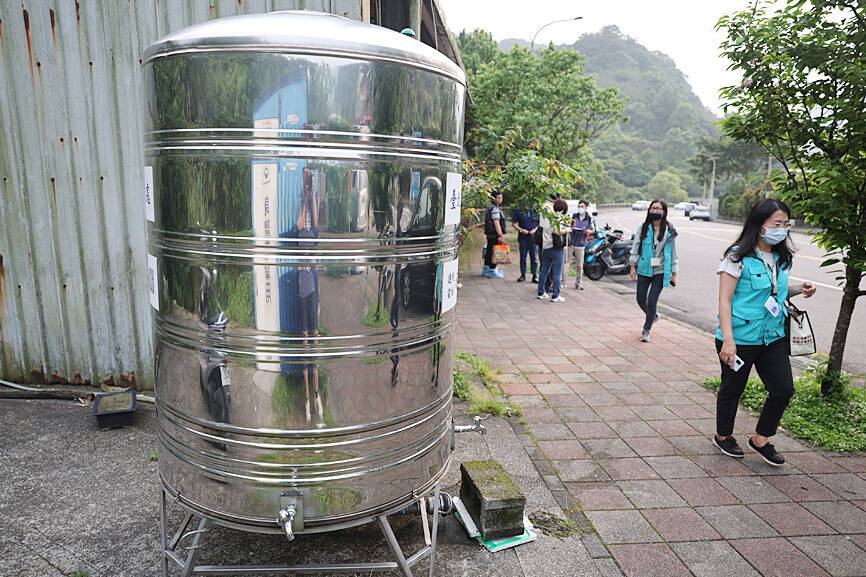As of yesterday noon, 41 residents of Xishan Borough (溪山) in Taipei’s Shilin District (士林) had developed symptoms of stomach flu, which might have been caused by consuming mountain spring water, with 30 of them having sought medical treatment, the Taipei Department of Health said.
The other 11 are recuperating at home and nobody is in a serious condition, the department said.
On Thursday, Xishan Borough Warden Huang Hui-fen (黃慧芬) said that since Wednesday last week, when an earthquake measuring 7.2 on the Richter scale rocked Taiwan, about 100 borough residents had reported symptoms of acute gastroenteritis — or stomach flu — including vomiting and diarrhea.

Photo: CNA
The sick all live in the same water source area, she said, adding that many households in the area have their own water supply system instead of the tap water provided by the Taipei Water Department and many saw three to four family members display similar symptoms.
The incident might have been caused by the powerful quake, as the seismic activities could have tainted the water source, Huang said.
As of press time, there had been no official statement confirming Huang’s hypothesis.
Also yesterday, the Taipei Water Department said in a statement that an inspection conducted on Monday indicated a higher-than-usual amount of Escherichia coli, or E coli, was present in the untreated spring water they used.
Such water must always be boiled before drinking due to the possibility of contamination, it said.
E coli is a common kind of bacterium found in the intestines of humans and other warm-blooded animals, but its presence in food and water is a strong indicator of contamination, Centers for Disease Control spokesperson Tseng Shu-hui (曾淑惠) said.
Food poisoning induced by the bacteria usually takes place five to 48 hours after consuming contaminated substances, and the seriousness of the symptoms varies largely from person to person, with cases involving younger people tending to be more severe, Tseng said.
By Thursday evening, the water department had set up five temporary stands to provide residents with clean water.

SHIPS, TRAINS AND AUTOMOBILES: The ministry has announced changes to varied transportation industries taking effect soon, with a number of effects for passengers Beginning next month, the post office is canceling signature upon delivery and written inquiry services for international registered small packets in accordance with the new policy of the Universal Postal Union, the Ministry of Transportation and Communications said yesterday. The new policy does not apply to packets that are to be delivered to China, the ministry said. Senders of international registered small packets would receive a NT$10 rebate on postage if the packets are sent from Jan. 1 to March 31, it added. The ministry said that three other policies are also scheduled to take effect next month. International cruise ship operators

NUMBERS IMBALANCE: More than 4 million Taiwanese have visited China this year, while only about half a million Chinese have visited here Beijing has yet to respond to Taiwan’s requests for negotiation over matters related to the recovery of cross-strait tourism, the Tourism Administration said yesterday. Taiwan’s tourism authority issued the statement after Chinese-language daily the China Times reported yesterday that the government’s policy of banning group tours to China does not stop Taiwanese from visiting the country. As of October, more than 4.2 million had traveled to China this year, exceeding last year. Beijing estimated the number of Taiwanese tourists in China could reach 4.5 million this year. By contrast, only 500,000 Chinese tourists are expected in Taiwan, the report said. The report

The Forestry and Nature Conservation Agency yesterday launched a gift box to market honey “certified by a Formosan black bear” in appreciation of a beekeeper’s amicable interaction with a honey-thieving bear. Beekeeper Chih Ming-chen (池明鎮) in January inspected his bee farm in Hualien County’s Jhuosi Township (卓溪) and found that more than 20 beehives had been destroyed and many hives were eaten, with bear droppings and paw prints near the destroyed hives, the agency said. Chih returned to the farm to move the remaining beehives away that evening when he encountered a Formosan black bear only 20m away, the agency said. The bear

Chinese embassy staffers attempted to interrupt an award ceremony of an international tea competition in France when the organizer introduced Taiwan and displayed the Republic of China flag, a Taiwanese tea farmer said in an interview published today. Hsieh Chung-lin (謝忠霖), chief executive of Juxin Tea Factory from Taichung's Lishan (梨山) area, on Dec. 2 attended the Teas of the World International Contest held at the Peruvian embassy in Paris. Hsieh was awarded a special prize for his Huagang Snow Source Tea by the nonprofit Agency for the Valorization of Agricultural Products (AVPA). During the ceremony, two Chinese embassy staffers in attendance